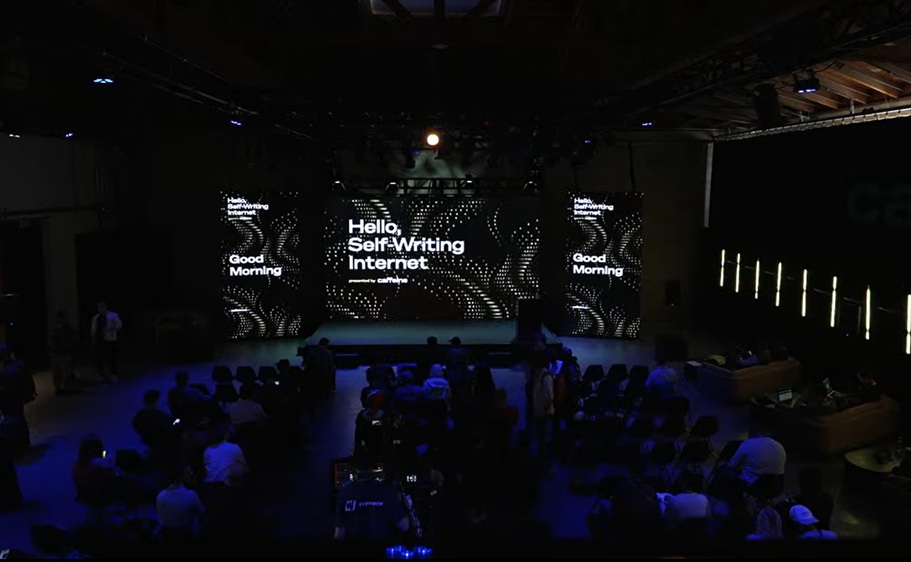 AI
AI
 AI
AI
 AI
AI
There are fewer than 50 million software developers around the world. The Dfinity Foundation has a plan to expand that number to 5 billion.
Dfinity took a step in that direction at the end of last month with its move into artificial intelligence-assisted app creation. Its alpha release of natural language-powered Caffeine AI signaled an interest in creating what the foundation has termed “the self-writing internet,” where any one of 5 billion web-connected smartphone users can build AI-driven apps in minutes.
“Self-writing will democratize app creation and app ownership at an absolutely massive scale,” said Dominic Williams, founder and chief scientist at the Dfinity Foundation. “Self-writing app cycles can be smartphone conversations. There could be 5 billion app developers out there.”
Dfinity’s bid to transform software development marks the Switzerland-based, not-for-profit organization’s major offering for the AI world. Williams spoke during the group’s “Hello, Self-Writing Internet” event in San Francisco this week, designed to launch Caffeine officially as an AI platform that uses natural language prompts to create fully functional applications.

Dominic Williams, founder and Chief Scientist at Dfinity Foundation.
During the event, Williams provided live on-stage demonstrations of the technology using prompts from his laptop such as “build a user blog similar to Medium” or “build me an online shop for my golf store with payment integration and the ability to add items.” Both applications were brought up live and functional in minutes, including a separate companion web app for the smartphone.
“You talk to evolve your app,” Williams said. “As you talk the code is written and the app is actually upgraded. In the future, development will happen at chat speed.”
Caffeine was launched on the Internet Computer Protocol or ICP, a third-generation blockchain that extends the internet into a decentralized computing platform. Williams acknowledged that controversy surrounding the cryptocurrency world could affect how Caffeine is perceived by the enterprise community, but he believes that its self-writing AI features will prove to be attractive.
“The Web3 industry’s reputation is a bit tarnished and probably rightfully so,” Williams said during an onstage interview. “Now people can, for themselves, experience what a decentralized network is. We’re going to see self-writing take over the enterprise space because the speed and efficiency are just incredible. This is palpable value and it has nothing to do with a token.”
That value poses an intriguing challenge to one particular area of the software world: the App Store. As part of Caffeine’s alpha release, users can explore an App Market feature to clone, adapt and iterate on a library of starter applications. The “clone” rather than “buy” function offers a different take on the traditional App Store model, as Caffeine users can download and then modify apps for their own purposes.
“App stores today obviously operate on gatekeeping,” Pierre Samaties, chief business officer at Dfinity, said during the event. “That’s going to erode.”
Samaties also noted during his appearance at the San Francisco gathering that AI model powerhouse Anthropic Inc. has partnered with Dfinity on Caffeine. Though the foundation did not provide specifics, online posts this week from developers noted that Dfinity has been using Anthropic’s Claude Sonnet to drive Caffeine’s backend logic on the ICP.
Anthropic launched Claude 3.7 Sonnet in February, and its features can help support the integration of blockchain technology in providing verifiable and tamper-proof AI models. Sonnet includes Constitutional AI, a set of rules designed to ensure that AI behaves in a way that is aligned with human values, according to William Stranzl, GTM at Anthropic, who appeared with Dfinity’s Samaties during the event.
“It’s a set of principles that help the model have the right behaviors,” Stranzl said. “These models are starting to become a partner to the person.”
Caffeine offers a glimpse into the potential of decentralized computing and the future of Web3. It has entered the conversation as a number of topics swirl around the enterprise computing world, including AI, vibe coding, app development and the global influence of large language model providers such as Anthropic. For Dfinity’s Williams, the North Star remains the internet and reimagining its place in the world of AI.
“You are just going to be talking, mutating your app,” Williams said. “It has the data and the functionality, but you are now interacting with a user experience that is generated on the fly. Every existing website can be transformed into a kind of microservice. There’s a lot of disruption coming to the web.”
Support our mission to keep content open and free by engaging with theCUBE community. Join theCUBE’s Alumni Trust Network, where technology leaders connect, share intelligence and create opportunities.
Founded by tech visionaries John Furrier and Dave Vellante, SiliconANGLE Media has built a dynamic ecosystem of industry-leading digital media brands that reach 15+ million elite tech professionals. Our new proprietary theCUBE AI Video Cloud is breaking ground in audience interaction, leveraging theCUBEai.com neural network to help technology companies make data-driven decisions and stay at the forefront of industry conversations.